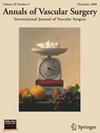Influence of Diabetes Mellitus on Outcomes of Patients Undergoing Carotid Artery Stenting: A Systematic Review and Meta-Analysis
IF 1.6
4区 医学
Q3 PERIPHERAL VASCULAR DISEASE
引用次数: 0
Abstract
Background
Diabetes mellitus is a well-known risk factor for adverse vascular events, yet its specific influence on carotid artery stenting (CAS) outcomes remains unclear. This study aims to determine if diabetes increases perioperative risks after CAS.
Methods
A systematic review and meta-analysis compared diabetic versus nondiabetic CAS patients. We searched PubMed, Embase, Scopus, and Cochrane Library for English cohort studies reporting outcomes by diabetic status. Primary outcome was perioperative stroke; secondary included transient ischemic attack (TIA), myocardial infarction (MI), death, restenosis, and stroke/death composite. Data were pooled using random-effects models. Heterogeneity was quantified by I2, and publication bias was assessed with Egger regression.
Results
Twelve cohort studies (22,226 patients; 7,415 diabetic) were included. Meta-analysis found diabetes was not significantly associated with increased risk of perioperative stroke (risk ratio [RR] 1.16; 95% confidence interval [CI] 0.79–1.69), TIA (RR 1.42; 95% CI 0.98–2.06), MI (RR 1.60; 95% CI 0.87–2.94), all-cause mortality (RR 0.90; 95% CI 0.61–1.32), and stroke/death composite (RR 1.07; 95% CI 0.79–1.45). However, diabetes significantly increased long-term target-vessel restenosis risk (RR 2.10; 95% CI 1.18–3.73; I2 = 37%). Heterogeneity was low (I2 0%–37%). Sensitivity analyses confirmed stability. Funnel plots were symmetric; the Egger test was nonsignificant (P = 0.383).
Conclusion
In carefully selected patients, diabetes does not elevate the short-term risks of stroke, TIA, MI, or death following CAS. However, it is associated with a significantly higher long-term risk of restenosis. These results support the safe use of CAS in diabetic patients but underscore the need for enhanced long-term surveillance to manage restenosis risk.
糖尿病对颈动脉支架植入术患者预后的影响:一项系统综述和荟萃分析
目的:糖尿病是众所周知的血管不良事件的危险因素,但其对颈动脉支架植入术(CAS)结果的具体影响尚不清楚。本研究旨在确定糖尿病是否会增加CAS术后围手术期风险。方法:对糖尿病和非糖尿病CAS患者进行系统评价和荟萃分析。我们检索了PubMed、Embase、Scopus和Cochrane图书馆中报告糖尿病状态结果的英语队列研究。主要结局为围手术期卒中;继发性包括短暂性脑缺血发作(TIA)、心肌梗死(MI)、死亡、再狭窄和卒中/死亡复合。使用随机效应模型汇总数据。异质性采用I2量化,发表偏倚采用Egger回归评估。结果:纳入12项队列研究(22 226例患者,7 415例糖尿病患者)。荟萃分析发现,糖尿病与围手术期卒中(RR 1.16; 95% CI 0.79-1.69)、TIA (RR 1.42; 95% CI 0.98-2.06)、心肌梗死(RR 1.60; 95% CI 0.87-2.94)、全因死亡率(RR 0.90; 95% CI 0.61-1.32)和卒中/死亡复合(RR 1.07; 95% CI 0.79-1.45)的风险增加无显著相关。然而,糖尿病显著增加长期靶血管再狭窄的风险(RR 2.10; 95% CI 1.18-3.73; I2 = 37%)。异质性较低(i20% -37%)。敏感性分析证实了其稳定性。漏斗图对称;Egger检验无显著性(p=0.383)。结论:在精心挑选的患者中,糖尿病不会增加卒中、TIA、MI或CAS后死亡的短期风险。然而,它与再狭窄的长期风险显著升高相关。这些结果支持在糖尿病患者中安全使用CAS,但强调需要加强长期监测以管理再狭窄风险。
本文章由计算机程序翻译,如有差异,请以英文原文为准。
求助全文
约1分钟内获得全文
求助全文
来源期刊
CiteScore
3.00
自引率
13.30%
发文量
603
审稿时长
50 days
期刊介绍:
Annals of Vascular Surgery, published eight times a year, invites original manuscripts reporting clinical and experimental work in vascular surgery for peer review. Articles may be submitted for the following sections of the journal:
Clinical Research (reports of clinical series, new drug or medical device trials)
Basic Science Research (new investigations, experimental work)
Case Reports (reports on a limited series of patients)
General Reviews (scholarly review of the existing literature on a relevant topic)
Developments in Endovascular and Endoscopic Surgery
Selected Techniques (technical maneuvers)
Historical Notes (interesting vignettes from the early days of vascular surgery)
Editorials/Correspondence

 求助内容:
求助内容: 应助结果提醒方式:
应助结果提醒方式:


